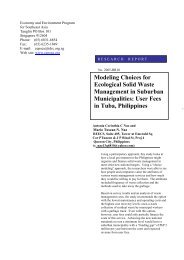systems research - the IDRC Digital Library - International ...
systems research - the IDRC Digital Library - International ...
systems research - the IDRC Digital Library - International ...
Create successful ePaper yourself
Turn your PDF publications into a flip-book with our unique Google optimized e-Paper software.
IMPACT ASSESSMENT OF FARMING SYSTEMS RESEARCH-BASED<br />
TECHNOLOGIES IN THE PHILIPPINES: THE ISABELA EXPERIENCE<br />
R. R. ~onza~a', C. V. C. ~ arba~, N. P. ~ordoncillo~, and N. F. C. an awe era'<br />
The apparent inability of conventionally developed agricultural technology to serve<br />
<strong>the</strong> needs of resource-poor farmers has led to <strong>the</strong> popularization of Farming<br />
Systems Research (FSR) as an alternative approach to <strong>research</strong> and development.<br />
During <strong>the</strong> last two decades, developing countries in Asia, Africa, and Latin<br />
America have adopted FSR and, most if not all, have institutionalized FSR in <strong>the</strong>ir<br />
National Research Systems (NARS). The FSR dornain is wide and varied. Activities<br />
in all phases of FSR are carried out in an interdisciplinary manner. Farmer<br />
participation is a key element. The approach requires a thorough understanding of<br />
<strong>the</strong> production <strong>systems</strong> of <strong>the</strong> farmer and <strong>the</strong> ways <strong>the</strong>y are conditioned by <strong>the</strong><br />
biophysical, socioeconomic, and political environments. The objective is to identify<br />
important farm production problerns and to design appropriate solutions that are<br />
not only technically and economically feasible but also sustainable. As such, FSR<br />
employs various tools, techniques, and methods from <strong>the</strong> socioeconomic and <strong>the</strong><br />
biological sciences.<br />
In spite of this methodological complexity, FSR has been accepted because it<br />
was deemed appropriate to <strong>the</strong> varied physical and socioeconomic conditions of<br />
farming environments in developing countries. Since <strong>the</strong>n, several FSR approaches<br />
and processes have emerged. It is imperative to assess <strong>the</strong> impact of technologies<br />
developed through FSR, not only to gauge <strong>the</strong>ir effectiveness and real contributions<br />
to small farmers, but also to make methodological improvements and redirect future<br />
efforts.<br />
The question, however, is by what measure should <strong>the</strong> contributions of FSR<br />
be assessed? In general, <strong>the</strong> explicit objective of FSR is to increase cropping<br />
intensity and improve cultural practices to achieve liigher output and factor<br />
productivity while increasing family income. It is implicitly assumed that <strong>the</strong><br />
improvement of <strong>the</strong> indicators of household welfare will follow. Ranaweera (1958)<br />
summarized <strong>the</strong> flow of <strong>the</strong> contribution of FSR to <strong>the</strong> different quality of life<br />
indicators (e.g., positive changes in purchasing power, asset accum~llation, quality of<br />
education, health, and household nutrition).<br />
The pathways to tliese quality of life indic~ltors exhibit complex relatio~~ships.<br />
Although it is con~monly mentioned that undernutrition is almost synonymous with<br />
poverty, and that income and purchasing power are key variables that allo\v <strong>the</strong><br />
household to purchase food items not produced on <strong>the</strong> farm and to diversify dietary<br />
'social Sciences Division, <strong>International</strong> Rice Research Institute, P.O. Box 933,<br />
hdanila, Philippines.<br />
"7nstitute of Human Nutrition and Food, College of Human Ecoloa, University of<br />
<strong>the</strong> Philippines Los Barios, College, Laguna, Philippines.
















